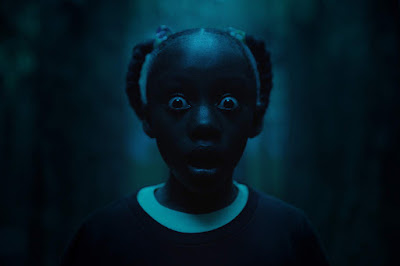In a prologue set in 1986 young Adelaide wanders from her inattentive father's care at the Santa Cruz fun park, makes her way down to the nocturnal beach and enters a hall of mirrors. There she finds her double who smiles as though to prove she is not a reflection. Adelaide is so traumatised that she loses her power of speech and begins years of therapy.
A title sequence moves back from a rabbit in a cage to show a wall of them is what looks like a classroom as an unsettling choral piece that mixes modal melodies with dissonance and electronic percussion.
In the present, the adult Adelaide is driving with her young family to their holiday home Santa Cruz. The family loads in for the holiday, they bicker at the dinner table but settle in to their vacation. Adelaide keeps noticing coincidental moments happening around them and feels increasingly off. And then their son comes in to tell them there's a family standing in the driveway. Going down to look they see a group of four, a mother and a father and a daughter and her brother. Apart from their strange red uniforms they seem the exact doubles of Adelaide's family.
There is too much to spoil beyond that point but I can say that the second act is a deftly controlled quilt of Adelaide's childhood memories and the weird home/life/identity invasion story that cracks and bangs like a string of penny bungers. And while it gets busy with the middle act struggle new themes emerge which at first feel like enrichment but are all foreshadows. Which is to say that the machine is a little more evident in this serious horror piece than you might expect. We are being informed as clearly as we were with the same team's Get Out that this horror of the Other across the divide (of stratification, privilege, culture and knowledge) wants you to reconsider the title itself as one character says: "We are Americans."
Jordan Peele has gone even further than his debut in approaching the horror movie as sociology lecture. But when it's delivered with such style and compulsion I'm not going to complain and call it preachy. While the denouement takes longer than it has to and starts dragging it does bear a payoff that seals the queasiness of the ideas of the film and sets in to haunt you after the credits have finished rolling.
If your thang is spotting cultural references you'll have a library of them in these frames. There is a Kubrickian sense of un-submersible units with the prologue and each act having its own distinct pallet (which makes things easy when the memory/current action montages really get swinging) and the cast led by the powerful Lupita Nyong'o is solid. I cannot fault the score that takes its job seriously and blends well with sourced music.
I was sold on the premise and the pedigree. I'm a lifelong horror nerd and appreciate any genre piece that gets down to work as hard as this does. If there's anything I wince at in a horror film it's moments where pact is broken with a situational laugh here or a flatly routine approach to what constitutes a scare (a trailer at my screening for the new James Wan guff was almost all jumps). Instead of sudden jolts or an over reliance on convention Us goes for our mental satisfaction, planting seeds of distaste and self-recognition there which we cultivate whether we want to or not. If this is what Jordan Peel can do then I can't think of anyone I'd rather at the helm of a ressurected Twilight Zone. Submitted for your approval....
PS. There are some massive plot holes in this film. I didn't mention this as it's an allegory rather than a realistic drama and I tend not to care too much about plot holes anyway. I understand why some people can't get past them I just tend not to share the concern.

No comments:
Post a Comment